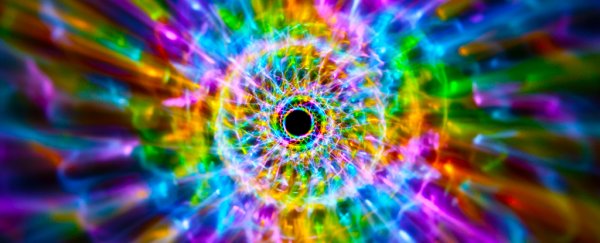LSD (lysergic acid diethylamide) is a synthetic compound with psychoactive characteristics. The chemical is typically ingested for recreational purposes, yet is increasingly being studied for its potential benefits as a therapeutic substance.
In a pure state, LSD appears as fine, odourless, white crystals. Yet thanks to its low therapeutic dose, it is generally diluted significantly before being applied to gelatin squares or small paper blotting sheets, which are then dissolved in the mouth or swallowed.
It originated from attempts to recreate biologically active components of the fungus ergot in the 1930s. Randomly combining the lysergic acid 'nucleus' chemical found in the pathogen with other chemical groups, chemist Albert Hoffman's 25th attempt produced a material that caused test animals to become excited.
Years later, affected accidentally by his tests, Hoffman was the first human to experience LSD's psychedelic effects as he tested the substance on himself.
What are the effects of LSD?
As a psychedelic substance, LSD has a wide range of psychological and physiological effects resulting from its influence on the brain and peripheral nervous system.
On lower doses, depending on the physiology of the individual, a person could experience changes to visual perception not unlike those experienced with optical illusions, a distorted estimation of time, and a heightened sense of pleasure and excitement. Many also experience upset bowels and difficulty managing temperature.
These effects are typically experienced within an hour or so of dosing and can last 12 to 15 hours.
Higher doses have been reported to increase visual hallucinations, influence sense of personal identity and connection with others and surroundings, and increase the risk of serious side effects such as heart palpitations and muscular tremors.
Extremely high doses don't seem to carry the same overdose mortality risks that many other pharmaceuticals do, though from the few cases on record, they don't seem to be pleasant experiences.
At the other end of the scale, extremely small 'microdoses' are being studied for their potential role in influencing sensations and behaviours on a more subtle level that's difficult to perceive. Early reports suggest potential effects could be increased focus, decreased pain perception, and generally improved cognitive health.
How does LSD work?
The structure of LSD appears to bind to receptors in the brain that would otherwise respond to serotonin and dopamine, neurotransmitters that play a role in pleasurable sensations.
The specific receptors and responses that are triggered by the chemical also happen to play key roles in mood regulation, sense of connection, and sensory perceptions.
What are the risks and benefits of LSD?
While LSD's potential for harm is relatively minor in comparison with other recreational drugs, there are serious consequences that pose risks.
Legally speaking, the hallucinogen is unlawful in most jurisdictions around the world. In some countries, its possession is considered a misdemeanor, while in others it is a controlled or prohibited substance that poses penalties or even jail time for possession or trafficking.
As an unregulated substance, doses aren't guaranteed to be unadulterated or precisely concentrated.
In medical terms, the impact of LSD can vary significantly from person to person, and even vary depending on time and place of use. An experience could induce anxiety and low moods, as well as uncomfortable perceptions, referred to as a bad trip.
Sleep can be especially hard during these episodes, and increase stress and exhaustion. In the worst cases, it might trigger episodes of paranoia or panic.
Frequent use over the short term can affect sensitivity, requiring larger doses to be effective. Heavy long term use can carry a risk of persistent forms of hallucination and psychosis.
However, in small, controlled doses, LSD could have a variety of psychiatric and other medical benefits. Combinations with other pharmaceuticals, such as MDMA, could help alleviate LSD's bad trips. Evidence also suggests LSD can synchronise functions of distinct areas of the brain, potentially benefiting mental health and assisting more traditional therapies.
All Explainers are determined by fact checkers to be correct and relevant at the time of publishing. Text and images may be altered, removed, or added to as an editorial decision to keep information current.
